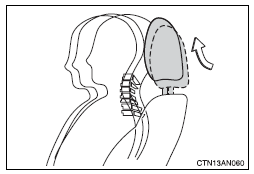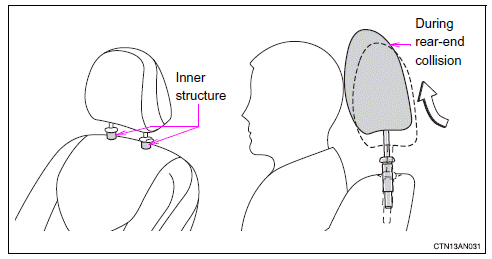 Toyota RAV4: Active head restraints
Toyota RAV4: Active head restraints

When the occupant’s lower back presses against the seatback during a rear-end collision, the head restraint moves slightly forward and upward to help reduce the risk of whiplash on the seat occupant.
■Active head restraints
Even small forces applied to the seatback may cause the head restraint to move. Pushing up a locked head restraint forcibly may appear the head restraint inner structure. These do not indicate problems.

CAUTION
■Seat adjustment
●Be careful that the seat does not hit passengers or luggage.
●Do not recline the seat more than necessary when the vehicle is in motion
to reduce the risk of sliding under the lap belt.
If the seat is too reclined, the lap belt may slide past the hips and apply
restraint forces directly to the abdomen or your neck may contact the
shoulder belt, increasing the risk of death or serious injury in the event of
an accident.
●Manual seat only: After adjusting the seat, make sure that the seat is
locked in position.
 Flattening front seatbacks
Flattening front seatbacks
The front seats can be moved into a flat seat arrangement.
Manual seat
1 Slide the second seats as far back as possible.
2 Remove the front head restraint.
Slide the front seat further forward
...
 Rear seats
Rear seats
■ Second seats
Vehicles with third seat
1 Seat position adjustment
levers
2 Seatback angle adjustment
levers
When a person sits in the rear
center position, adjust both
seat cushions t ...
See also:
Operation
The seats can be adjusted for a short period
after unlocking the door with the remote control
without the key in the ignition slot. Seat
adjustment is normally made when the ignition
is on and ...
From outside the vehicle
The remote key locks and unlocks all of the
doors and the tailgate.
Before the vehicle can be locked from the outside
with the remote key, the driver's door must
be closed. Any other door/tailg ...
Bluetooth (Infotainment Controls)
For vehicles equipped with the MyLink or IntelliLink infotainment system, see
the separate MyLink/ IntelliLink Features and Functions Guide for more information.
For information about how to naviga ...
